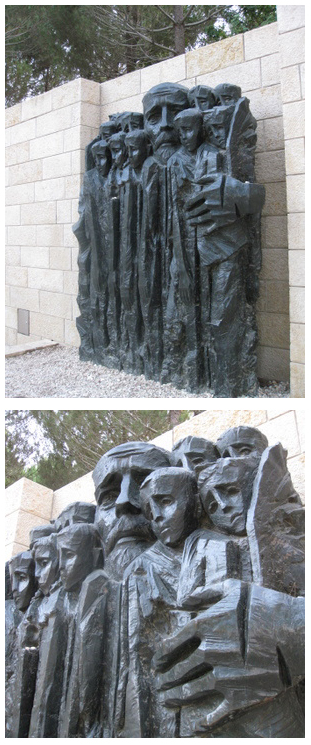

Holy Land: Korczak and his Ghetto Children
Matthew Harrison
Friday, November 14, 2008
 This statue, Korczak and his Ghetto Children is a statue found at the Yad Vashem Holocaust memorial. It's found in an area that remembers the over one million children who were victims of the Holocaust. Over one million children.
This statue, Korczak and his Ghetto Children is a statue found at the Yad Vashem Holocaust memorial. It's found in an area that remembers the over one million children who were victims of the Holocaust. Over one million children.
Dr. Janusz Korczak, who some of you may have heard of, wore many hats but as a Children’s author and a pediatrician it was his love for children that was the focus of his life work. He ran an orphanage that was forced to move in the Warsaw Ghetto in 1940. In 1942 Nazi soldiers came to take the nearly 200 orphanage children to the Treblinka extermination camps. Korczak always believed that as adults we must always speak like adults to children; not to sugar coat, to be honest with them. But in this situation Korczak did not – he told them they were going on an outing instead. To visualize this, let’s turn to an excerpt from W?adys?aw Szpilman's The Pianist:
One day, around 5th August when I had take a brief rest from work and was walking down Gesia Street, I happened to see Janusz Korczak and his orphans leaving the ghetto. The evacuation of the Jewish orphanage run by Janusz Korczak had been ordered for that morning. The children were to have been taken away alone. He had the chance to save himself, and it was only with difficulty that he persuaded the Germans to take him too. He had spent long years of his life with children and now, on this last journey he could not leave them alone. He wanted to ease things for them. He told the orphans they were going out in to the country, so they ought to be cheerful. At last they would be able exchange the horrible suffocating city walls for meadows of flowers, streams where they could bathe, woods full of berries and mushrooms. He told them to wear their best clothes, and so they came out into the yard, two by two nicely dressed and in a happy mood. The little column was lead by an SS man who loved children, as Germans do, even those he was about to see on their way into the next world. He took a special liking to a boy of twelve, a violinist who had his instrument under his arm. The SS man told him to go to the head of the procession of children and play – and so they set off. When I met them in Gesia Street the smiling children were singing in chorus, the little violinist was playing for them and Korczak was carrying two of the smallest infants, who were beaming too, and telling them some amusing story. I am sure that even in the gas chamber, as the Zyklon B gas was stifling childish throats and striking terror instead of hope into the orphans hearts, the Old Doctor must have whispered with one last effort, ‘it's all right, children, it will be all right’. So that at least he could spare his little charges the fear of passing from life to death.”
Categories:
Related Articles:
<<













